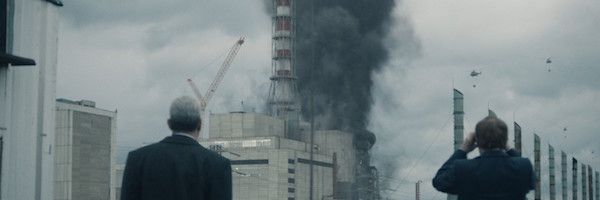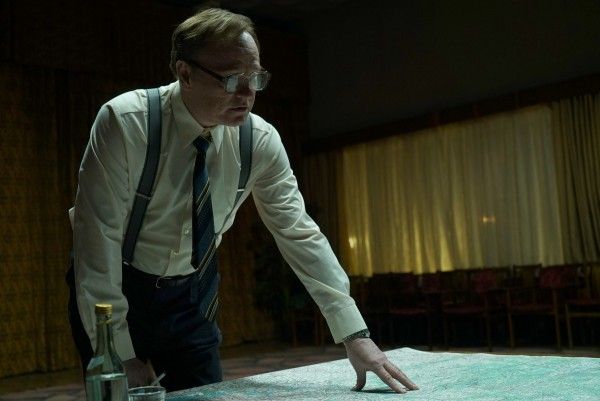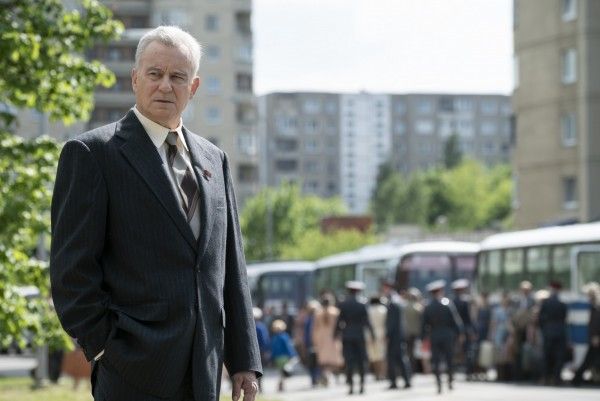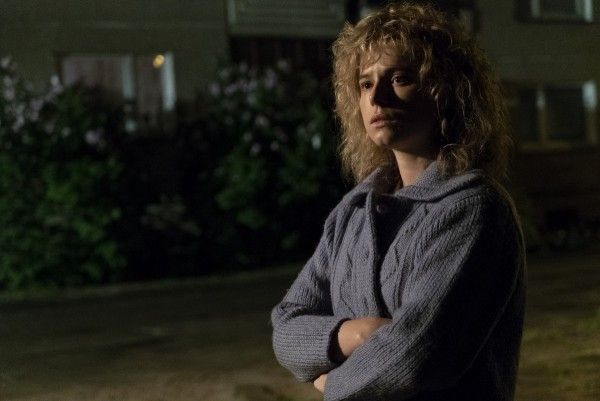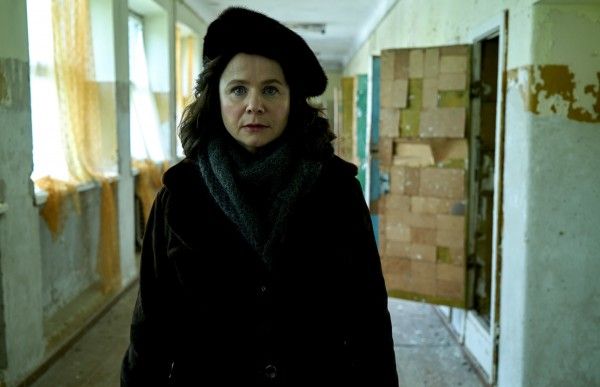What you need to know about Chernobyl, HBO’s 5-episode miniseries from Craig Mazin, is that you cannot understand how deeply it will destroy the very fabric of your being until you see it. Which is, strangely, analogous to the fallout from the meltdown of Chernobyl reactor #4. As it was happening, and in its immediate aftermath, no one understood what it meant. “You are dealing with something that has never happened on this planet before!” says scientist Valery Legasov (Jared Harris) when attempting to impress upon the Kremlin the unknowable scope of the event, which took place in April of 1986. But for us in 2019, we do know. At least, we know that simple, almost mundane scenes of children playing in the radioactive ash and men at the power plant letting irradiated water splash all over them equals death. But as a first responder picks up a rock and looks at it curiously, his hand melts away, and others start to know things too.
Chernobyl starts with a suicide, which really sets the tone for the doom and terror that pervades the entire work. Make no mistake, what Mazin (who wrote the series) and director Johan Renck have crafted is something devastatingly good, but the key word is devastating. The first two episodes of Chernobyl play out like a horror movie, with a hauntingly effective score to augment the slow reveals of the compounding disaster, as geiger counters begin humming like a cacophony of summer cicadas. The human toll is immense and visceral; a man holds open a door with his hip to help his comrades try and cool the exploded core (which cannot actually be done), and his hip disintegrates.
Besides the opening scene and the closing episode, Chernobyl plays out in a linear narrative that makes you feel trapped inside a nightmare. There is a cloud of death that no one can see, except that we can see its effects on the faces of those who encounter it as their skin sloughs off. Every additional person conscripted to try and stop the meltdown from spreading — and potentially killing millions across Europe — is the face of someone you know will die probably soon and horribly. And yet, it’s also clear that their sacrifices for what had to be done are nothing short of heroic.
What makes the entire disaster worse, which Mazin really drives home in the script, is the web of lies and deceptions leading up to the meltdown and which defined its aftermath. You’ve never known rage like hearing those in denial tell others that what they are seeing simply isn’t happening. It’s beyond frustrating. It’s maddening. But that is the power of what Chernobyl is able to achieve; it’s a miniseries that makes you feel, deeply, in a cascade of emotions affecting body and soul. There are a lot of horrible moments, but never for the sake of themselves. Be forewarned that one episodes spends a significant amount of time on a beleaguered, husk of a squadron responsible for finding and killing all pets in the evacuation zone because they too are contaminated. (You think playing Fallout has prepared you for seeing a man with no lips have his skin peel off around his skull? What about a man who must execute a brood of puppies?)
Given this, and other horrors, it will be easy to say that this fictionalized account is amped up for drama. And yet, in speaking to critics at the TCA Press Tour this past January, Mazin explained:
“This is as close to reality as we can get and still be able to tell the story in five episodes. It was our obsession, and certainly our intention all the way, to be as accurate as we could be. The simple rule that we had, if we were going to change something, it had to be only so that we could tell the story fully. We never changed anything to make it more dramatic than it was, to hype anything, to amp it up. For us, this is a story about truth. The last thing we wanted to do was fall into the same trap that liars fall into. This is very much a well researched factual dramatic representation.”
You feel that desire for authenticity throughout. The finale also takes the time to very clear lay out how everything happened and why, which might be one of the greatest feats of scientific narration on television. You will come to know how a nuclear reactor operates, why stalling it out would cause an explosion, and why Chernobyl’s particular failsafe was never designed to work. But it comes at the end for a reason — yes, those explanations are important for making sure a meltdown like this doesn’t happen again, but what we first have to see is why that is so important, and live in the confusion to understand what Chernobyl meant on a personal level, a local one, and within the Soviet Union itself. As Legasov sums up, “this is how a nuclear reactor explodes: lies.”
Chernobyl is stocked with an excellent cast (who do not attempt any real accents other than their own, mercifully), including Stellan Skarsgard who plays the real-life figure Borys Shcherbina. To see Shcherbina go from an arrogant dismissal of the disaster to a shocked understanding to, finally, a grim acceptance of his own death is exceptionally moving, as is the real story of a young wife, Lyudmyla Ignatenko (Jessie Buckley) who watches her husband die while she herself is exposed to his radiation with devastating consequences. Emily Watson plays a composite character, Ulyana Khomyuk, who is meant to represent all of the scientists who assisted Legasov and were imprisoned and silenced for speaking out against the state’s official lines on the meltdown, and she does so with muted stoicism. The heroes of Chernobyl are quiet, hesitant, and ultimately sacrificial. There is a dreamy optimism to statements like “all victories must come at a cost,” knowing that something was lost for the greater good. That is, until you see the smarmy faces of the three men whose greed, incompetence, and arrogance caused this unnecessary tragedy, and then it only feels like loss.
Chernobyl is a series where you will have to remind yourself to unclench your jaw and un-tense your shoulders while watching it. It is heartbreaking and intense, and a hell of a thing to watch the day after Game of Thrones. But it’s also necessary. As Mazin also said back in January:
“To me, the cautionary tale here is bigger than just the nuclear power industry, or even the environment. The cautionary tale here is about what happens when people choose to ignore the truth. It doesn’t care, as it turns out – the truth does not care. The world gets hotter whether we agree with it or not, and that is something that I hope people can take away from the show – that in the end, we have choices about what we will or will not confront as true, but the truth does not care, and it will come to pass.”
Rating: ★★★★★
Chernobyl premieres Monday, May 6th on HBO.

